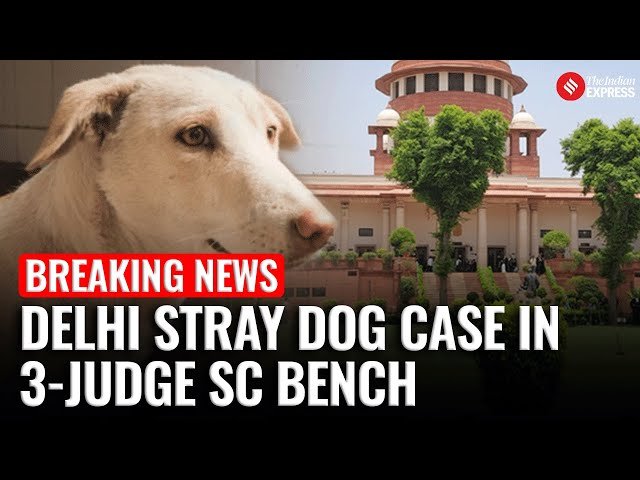Supreme Court Reserves Order on Stray Dog Relocation Amid National Debate
The Supreme Court of India has reserved its decision on an interim plea challenging a previous directive that all stray dogs be rounded up and moved to shelter homes. The case, which has drawn national attention, could have a ripple effect on similar rulings in other states, including Rajasthan and Tamil Nadu.
The plea seeks a stay on an earlier order issued by a bench led by Justice JB Pardiwala, which called for mass relocation of stray dogs from public spaces into shelters. Critics argue the move is impractical and could harm both animals and communities.
Bench Criticizes Authorities for Inaction
A three-judge bench, headed by Justice Vikram Nath, expressed sharp criticism of the Municipal Corporation of Delhi (MCD) and local authorities for their long-standing failure to implement the Animal Birth Control (ABC) Rules. According to the court, years of inaction have allowed the stray dog population to grow unchecked, leading to the current situation.
The bench also questioned why Delhi authorities had already begun rounding up stray dogs before the written order was formally issued the previous night. The justices warned that authorities would be held accountable for their handling of the matter.
Arguments Against Mass Relocation
Several senior advocates, including Kapil Sibal, Gopal Sankaranarayanan, and Abhishek Manu Singhvi, have opposed the relocation plan, citing multiple challenges:
-
Lack of Infrastructure – Experts estimate that the NCR region alone would need around 3,000 shelter homes to house the 3 lakh stray dogs currently on the streets.
-
Financial Burden – Feeding, medicating, and caring for lakhs of animals would require enormous taxpayer-funded budgets.
-
Health Hazards – Overcrowded shelters could become breeding grounds for diseases, posing risks to both animals and humans.
-
Risk of Culling – Activists fear that relocation efforts may lead to the killing of dogs instead of humane rehabilitation.
-
Shelter Limitations – Current facilities are designed for short-term treatment and recovery, not permanent housing.
Opponents argue that the order represents a step backwards, moving away from WHO-endorsed ABC programs, which focus on sterilization and vaccination, towards outdated “pound” systems that have historically failed.
Changing Directives and Adoption Drive
Initially, Justice Pardiwala’s bench stated that residents could not “adopt” a stray dog overnight to protect it from being rounded up. However, the written order issued later made a notable shift—encouraging Delhi residents to adopt stray dogs, responding to growing concerns from animal welfare groups.
Animal Welfare Perspective
Animal activist Amika Shukla called the original order a “mistake”—arguing it was unconsidered, unreasoned, and imbalanced. She believes the solution lies in strengthening the ABC program with full participation from animal welfare experts, NGOs, and local communities.
According to Shukla, human welfare and animal welfare should be seen as complementary, not competing priorities. She urged the government and judiciary to work with domain experts and individuals familiar with animal behavior to develop practical, humane solutions for coexistence.
Wider Impact Across India
The Supreme Court’s eventual ruling could set a precedent for stray dog management policies nationwide. Several high courts, including the Rajasthan High Court, have issued similar directives, while Tamil Nadu has been considering related measures.
Given the polarizing nature of the issue, the case has sparked intense debate on social media, with hashtags like #SaveStrays and #HumaneSolutions trending. Supporters of relocation stress the need for public safety amid rising dog bite incidents, while animal lovers argue for compassion and scientific management over mass removal.
The Road Ahead
As the court deliberates, stakeholders await a decision that could reshape India’s approach to stray animal management.
A balanced policy—combining public safety, humane treatment, and scientific control methods—may be the only way forward. Until then, the future of millions of stray dogs in India remains uncertain.
For official updates, readers can refer to the Supreme Court of India and follow coverage from The Hindu and NDTV.

